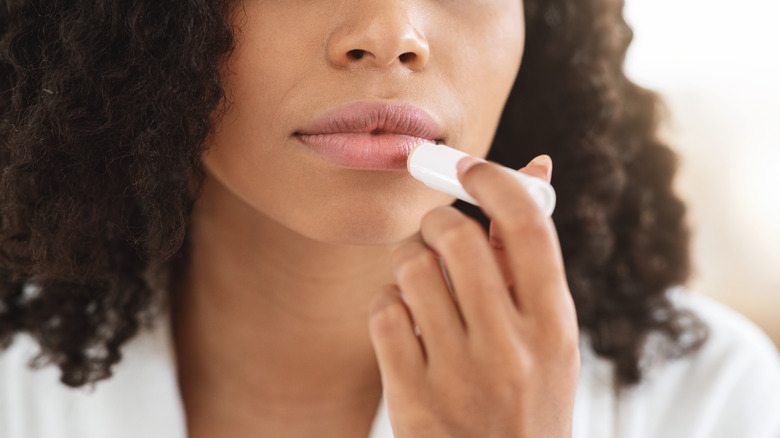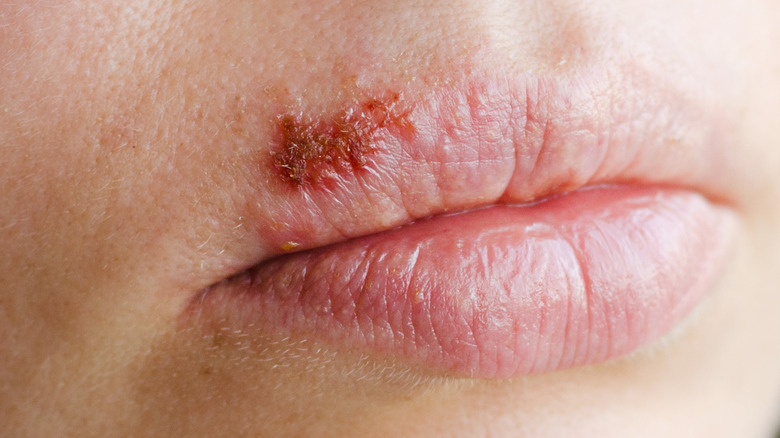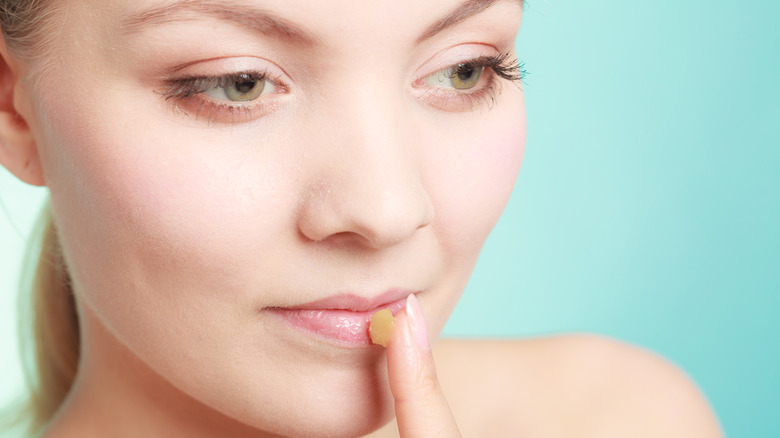Are Your Lips Chapped Or Do You Have A Cold Sore? Here's How To Tell
It always seems to happen at the most inopportune moment. You've just tried your trendy black lip gloss for the first time when you notice your scaly, dry lips are ruining the softly lush effect. Or just before going out on a first date, you discover that odd tingle you've been feeling on your upper lip has suddenly turned into two little blisters.
Your mouth is an important part of your overall appearance, so anything that makes your lips look unappealing can wreak havoc with your self-confidence. Not to mention that lip pain really hurts! The skin on your lips is more sensitive than the skin on the rest of your body: It's thinner, has no hair for protection, and is constantly exposed to the sun.
Lip skin also doesn't retain water easily, making it more prone to dryness. That, in turn, can lead to problems such as cold sores, chapped lips, or angular cheilitis — those painful cracks that occur in the corners of your mouth. Because cold sores in particular require special care and precautions, it's important to know how to spot them and distinguish them from regular dry lips. Here's what to know.
Cold sores are a long-lasting nuisance
Like chapped lips, cold sores are likely to occur during very hot or cold weather, or as the result of a weakened immune system. Unlike chapping, however, cold sores are an infection caused by the herpes simplex virus type 1, and their unsightly appearance is a dead giveaway. According to WebMD, sufferers are usually alerted to an outbreak by a tingling sensation on the outside of their lips.
Then comes a one to two-week progression in which small blisters form on the affected area, which eventually break open, ooze, and scab over. Some people also develop other symptoms, such as swollen glands, body aches, and fever (cold sores are also known as fever blisters). The herpes virus is highly contagious, so if you develop a cold sore, you'll need to avoid kissing anyone or sharing cups, utensils, or towels. If you've never had a cold sore before, or if your symptoms are too uncomfortable, see your doctor.
While the condition can go away on its own, prescription and over-the-counter remedies will reduce the pain and help the sore heal more quickly. The other catch is that once you've had the virus, it stays in your body indefinitely, so more flare-ups are always possible. Keep track of any foods, stresses, or environmental conditions that might be setting off an outbreak. The Mayo Clinic notes that once you've had a cold sore, recurrences are usually less severe and frequent, but see your doctor if you're concerned.
Pamper your lips to avoid chapping
Though both cold sores and chapped lips are similarly painful, there's a distinct difference between the two. As the Cleveland Clinic clarifies, chapped lips occur when the skin on the mouth dries out, resulting in cracking, peeling, and sometimes even bleeding when the skin splits. However, chapping doesn't cause the blisters or scabs of a cold sore. Exposure to cold, hot, or dry air can cause chapping, as can excessive lip-licking. Contrary to what you might think, saliva can actually remove moisture from your lips.
Some medical conditions, like autoimmune disorders, can also make chapping more likely. Treating chapped lips is as simple as keeping them consistently moisturized, especially during the extreme weather months. Make a habit of keeping a lip balm — preferably one with sunscreen — in your purse or pocket, and apply it after eating, drinking, or whenever your lips feel dry. Drinking plenty of water throughout the day will also help hydrate your skin, including the lips.
If the problem persists, a nightly "lip slugging" routine can rid you of chapped lips for good. After washing your face, dab a little water onto your mouth, then apply a lip mask or unscented facial moisturizer. Follow up with a layer of petroleum jelly (Vaseline); this creates a barrier that keeps the moisture intact while you sleep. Bottom line: Taking care of your general health, as well as regularly pampering your lips, can keep your mouth feeling and looking great.


